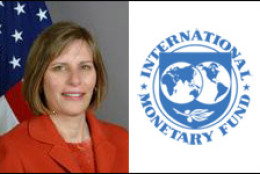State Department
-
Sens. Carl Levin (D-Mich.) and John McCain (R-Ariz.) sent a letter to the Defense Secretary Panetta and Secretary of State Clinton asking them to consider further actions against contractor Pratt & Whitney Canada. P&WC pleaded guilty in June to illegally exporting military software to China.
August 13, 2012 -
A new Government Accountability Office report found that three main actors in contingency contracting — the Defense and State Departments and the U.S. Agency for International Development — will likely only implement a fraction of the recommendations set out by the Commission on Wartime Contracting. The agencies have either determined their existing policies already address the commission's concerns or they disagreed with the recommendation in the first place, GAO found.
August 02, 2012 -
Susan Swart left the State Department for the International Monetary Fund CIO. She reflects on her successes and the change in federal technology.
August 02, 2012 -
On the In Depth show blog, you can listen to the interviews, find more information about the guests on the show each day and links to additional resources.
July 17, 2012 -
Laura Williams, an eDiplomacy liaison officer with the State Department's Bureau of Information Resources Management, was nominated for her work improving staffing in the agency's IT department.
July 16, 2012 -
DoD attracts and retains more employees through an increased involvement in the student loan repayment program.
July 05, 2012 -
Susan Swart, who has served as the State Department's chief information officer since 2008, is stepping down to become the CIO of the International Monetary Fund, according to an IMF release.
June 28, 2012 -
Michelle Bernier-Toth is the managing director of Overseas Citizens Services in State's Bureau of Consular Affairs and a finalist for a Service to America Award.
June 12, 2012 -
On the In Depth show blog, you can listen to the interviews, find more information about the guests on the show each day and links to additional resources.
June 11, 2012 -
In a first-ever interview, key officials from the Departments of Defense and State responsible for planning the transition to a diplomatic-led mission in Iraq discuss how the two agencies coordinated one of the largest overseas logistical operations since World War II. The article is the first part in Federal News Radio's special report, Trial by Fire: Overseas Contracting in Transition, part of the series, Inside the World's Biggest Buyer.
June 06, 2012 -
When the Defense Department began contingency contracting operations on a large-scale in Iraq in 2003 it was largely a trial by fire. Despite the best planning, DoD lacked the programs and practical solutions to handle the environment, officials say. Since then, commissions, panels and lawmakers have offered fixes and DoD has evolved to try to create "rock-solid" reforms. Federal News Radio examines these issues in the next part of our series, Inside the World's Biggest Buyer.
June 05, 2012 -
The State Department's share of overseas contingency contracting has grown over the last few years as the department took on new activities and functions as the military departed Iraq. Still, the budget shows, the Defense Department is the main player in overseas contingency contracting. And there's no guarantee Congress won't turn to the foreign affairs budget in its efforts to dramatically reduce the deficit.
June 05, 2012 -
Federal employees were less satisfied with their pay after the two-year pay freeze went into effect in 2010, according to a report by the Partnership for Public Service. Although higher-ranking feds were most satisfied with their pay, the highest-ranking feds — those at the SES level — had the biggest dip in pay satisfaction over the previous year.
May 29, 2012 -
A survey of nearly 60,000 college students found some federal agencies rank high as ideal employers post-graduation.
May 24, 2012 -
Undersecretary for Management Patrick Kennedy said told The Federal Drive with Tom Temin and Emily Kopp the State Department will be offering its experience and guidance to Secret Service employees when they are working in foreign countries.
May 01, 2012



